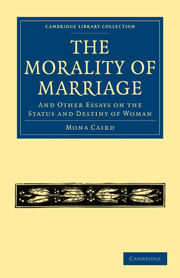A DEFENCE OF THE “WILD WOMEN”
Published online by Cambridge University Press: 16 May 2011
Summary
“What a great deal of trouble it would save the human race if once and for ever the predominant male would wake up to see that he has no more right to say what a woman shall or shall not do than a woman has to say what a man shall or shall not do.”
—Anon.The first impulse of women whom Mrs Lynn Linton calls “wild,” is, probably, to contradict the charges that she makes against them in the course of three ruthless articles in the Nineteenth Century; but reflection shows the futility as well as the inconsequence of such a proceeding. After all, those who have lost faith in the old doctrines are not so much concerned to prove themselves, as individuals, wise and estimable, as to lead thinking men and women to consider popular sentiments with regard to the relation of the sexes, and to ask themselves whether the social fiat which for centuries has forced every woman, whatever be her natural inclination or powers, into one avocation, be really wise or just; whether, in truth, it be in the interests of the race to deprive one half of it of all liberty of choice, to select for them their mode of existence, and to prescribe for them their very sentiments.
To the task of opposing the conclusions of Mrs Lynn Linton, her adversaries must bring considerable force and patience, and for this singular reason, that she gives them nothing to answer.
- Type
- Chapter
- Information
- The Morality of MarriageAnd Other Essays on the Status and Destiny of Woman, pp. 159 - 192Publisher: Cambridge University PressPrint publication year: 2010First published in: 1897



